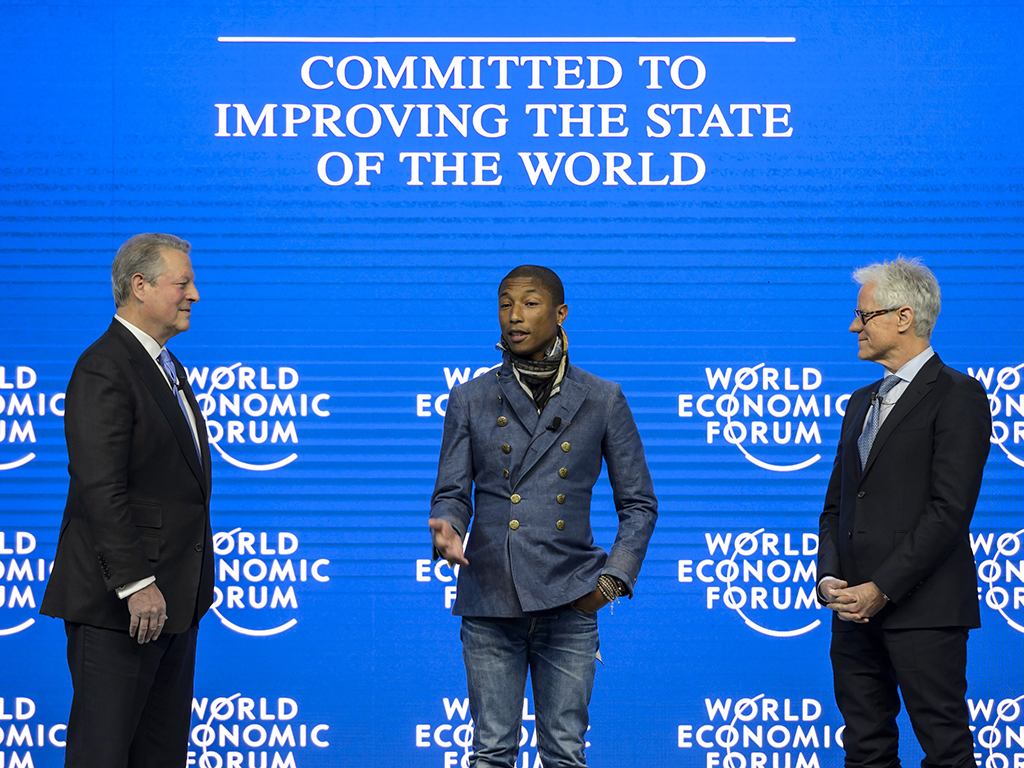Davos day one and two – the talking points
We take a look at the first two days of the World Economic Forum and major talking points to have emerged so far

Popstar Pharrell Williams (centre) and former US Vice President Al Gore spoke passionately of their climate change event, 'Live Earth: Road to Paris', at Davos
Europe’s twin challenges
On the day that the ECB unveiled a €1.1trn QE programme, key government figures from Finland, Ireland, Latvia, Germany and the Netherlands gathered to debate how the continent could best promote economic growth and stability. “The task for Germany now is to support the European Union, but every country needs to have the courage to undertake structural reforms”, said Sigmar Gabriel, Germany’s Vice-Chancellor and Federal Minister of Economic Affairs and Energy. “Politicians fear losing elections if they undertake structural reforms, but the alternative is to prolong the crisis.”
In tech we trust
Academics and key technology industry names gathered to discuss how the digital revolution must work to gain trust before consumers feel they’ve lost control of their data. “Personalised internet is a better internet”, said Marissa Mayer, President and CEO of Yahoo. “What is clear is that users own their data and should have control of how their data is used.” In the discussion, the panellists admitted that there was a disconnect between data protection and retention, and that without better transparency and data protection laws, privacy concerns would continue to mount.
Live Earth
The opening day saw the unlikely pairing of musician Pharrell Williams and former US Vice President Al Gore announce a series of concerts to raise awareness and demand action on climate change. The event, which was given the title Live Earth: Road to Paris, aims to unite “A billion voices to deliver this single message to world leaders: Take climate action now.” Scheduled to take place on June 18, the event will be broadcast in over 190 countries and bears certain similarities with 1985’s Live Aid.
Merkel speaks up
Angela Merkel featured on the panel in a session entitled Global Responsibilities for a Digital Age and spoke at length about the freedom of democracy, the economy and the situation in Europe. “We want to remain a stable anchor in Europe”, she said. “We need jobs, and these jobs have to be created in those areas which promise long-term, highly qualified employment.” The German Chancellor also referenced the attacks in Paris on several occasions, and said on the subject: “Democracy must be our answer to terrorism.”
The new context for Japan
Shinzo Abe’s victory in December’s snap election means that his Liberal Democratic Party have enough support to follow through on his three arrows. The government in December passed a series of reforms in a bid to boost consumption and give strength to the recovery, and those on the panel insisted that they would continue to revitalise the economy is this way. Panellists agreed that a Trans-Pacific Partnership was the country’s “highest priority”, though deregulation in the healthcare, agriculture and energy sector, alongside a focus on markets outside of Tokyo and Kyoto were also highlighted as areas in need of attention.













